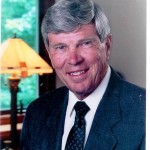Lecture Date: April 12, 2016
The talk will not be a traditional biography of Davis, but rather, in the words of Professor James McPherson, “Jefferson Davis and the General Who Would not Fight” – an approach that will illustrate much about Davis’s complex and controversial personality. As commander in chief of the Confederate armed forces in the Civil War, Davis faced numerous problems. One problem he had in common with his Union adversary, Abraham Lincoln, was dealing with fractious and egotistical generals who found reasons to disobey or resist orders to take the war to the enemy. In Davis's case, the most problematical general was Joseph E. Johnston, who found numerous ways to avoid battle or resist Davis's requests or orders for certain actions against the enemy, which infuriated Davis and caused him to remove Johnston from command or reduce the general's responsibilities on more than one occasion. Johnston's political allies did a great deal to undermine Davis's authority. The tensions and conflicts between the commander in chief and one of his top generals did a great deal to handicap the Confederate war effort.
Speaker: James M. McPherson

James M. McPherson was born in North Dakota and grew up in Minnesota, where he graduated from Gustavus Adolphus College magna cum laude in 1958. He became interested in Civil War and Southern history while a graduate student at Johns Hopkins University, where he earned his Ph.D. in 1963. From 1962 to 2004 he taught at Princeton University, where he is currently the George Henry Davis '86 Professor of American History Emeritus. He is the author or editor of more than twenty books, mostly on the era of the American Civil War and Reconstruction. Several of his books have won major prizes, including the Pulitzer Prize in History (1989) for Battle Cry of Freedom: The Civil War Era, and two Lincoln Prizes (1998 and 2009) for For Cause and Comrades: Why Men Fought in the Civil War and Tried by War: Abraham Lincoln as Commander in Chief. Among other history prizes he has won is the Pritzker Prize for Lifetime Achievement in Military Writing (2007) and the Arthur M. Schlesinger Prize of the Society of American Historians for excellence in the writing of history (2014). He has been president of the Society of American Historians (1999-2000) and the American Historical Association (2003-04), and is an elected member of the American Philosophical Society and the American Academy of Arts and Sciences.